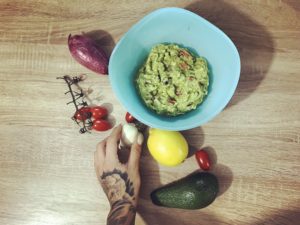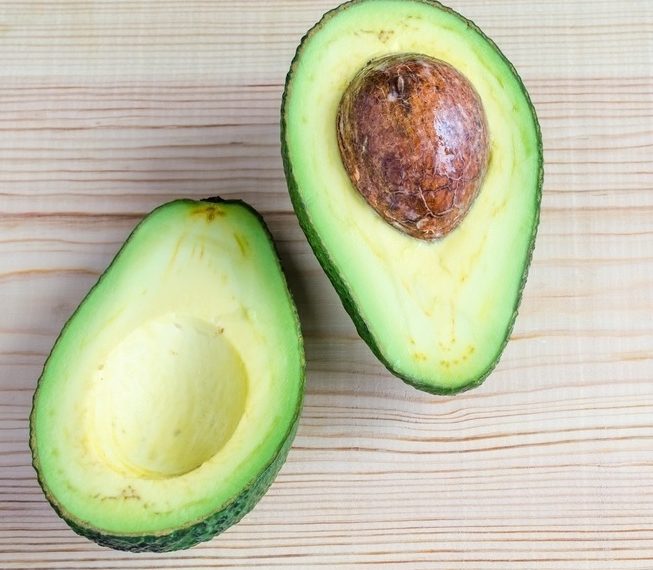One of my favourite food is avocado, a delicious fruit that is high in healthy monounsaturated fats, has a lot of benefits, and is super tasty either consumed simply in salads, deserts or as guacamole dip.
Here’s a my quick, delicious breakfast using avocado:

For a couple hundred calories, avocado is one of the top superfoods to add to your everyday diet, making a filling addition to any meal or snack, while providing nutritious heart-healthy fats, fibers, folate, vitamin A, potassium and more. It has many essential nutrients and by eating it you care enjoy its benefits like improved heart and digestive health, cancer prevention, balancing your hormones, improving your vision, beautiful skin, hair and nails and because of its fibers that speed up the digestive system it will lower your cholesterol.
Avocado is not that low in terms of calories, but as I mentioned before, I don’t care at all about calories. It contains healthy fat, fiber and phytochemical content, and this super nutrient food should only help you lose weight, if consumed properly.
Let’s take a look into its benefits :
Monounsaturated fats — Shown to reverse insulin resistance and regulate blood sugar levels, avocados and avocado oil are some of the richest sources of monounsaturated fats (MUFAs) in the world! Unlike saturated, or “bad,” fats, MUFAs are actually good for you and help the heart and brain. MUFAs are the main dietary form of fat in the Mediterranean diet, which for decades has been linked to protection against heart disease, cancer, cognitive decline and many other disorders.
Carotenoids — Avocados contain oleic acid, a monounsaturated fat that can improve memory and brain activity. (3) Oleic acid in turn helps the body with carotenoid absorption. Carotenoids are chemical compounds that give certain fruits and vegetables their bright yellow, orange or red color. Beta-carotene is one of the most common carotenoids. Carotenoid benefits include lowering inflammation, promoting healthy growth and development, and boosting immunity, among others.
Fat-soluble vitamins A, E and K — Our bodies not only require these vitamins to function properly, but they also work together in an integrated way with essential minerals (such as magnesium and zinc) to impact metabolic factors (such as carbon dioxide and thyroid hormone).
Water-soluble vitamins B and C — I’m not sure if you knew this, but B-complex vitamins and vitamin C are not stored in your body. This means that you need to replenish them every day. Avocados are one of the better vitamin C foods and sources of B vitamins, which reminds me of my mantra: “An avocado a day keeps the medical doctor away!”
Important trace minerals (like magnesium, potassium, iron and copper) — One interesting fact many people are unaware of is that you would need to eat two bananas to meet the potassium content in just one whole avocado, which makes avocados an excellent source to prevent low potassium.
Loads of fiber – Avocados contain more soluble fiber than most foods and help stabilize blood sugar levels, facilitate proper bowel regularity and maintain proper weight control.
Protein — Avocados are on the list of top protein foods. Having the highest protein and lowest sugar content of any fruit, avocados offer a unique balance to building lean muscle mass and burning fat.
Antioxidant phytochemicals (such as beta-sitosterol, glutathione and lutein) — To help protect against various diseases like macular degeneration and cataracts, it’s a good idea to eat a diet rich in phytochemicals like avocados. Antioxidant phytochemicals prevent oxidative damage (also called free radicals) that have the power to change DNA and result in cell mutations.
Folate — Because of its high supply of the crucial nutrient folate, avocado benefits include preventing certain birth defects like spinal bifida and neural tube defects. Research has even suggested that folate-rich foods can help prevent strokes!
Phytonutrients (polyphenols and flavonoids) — Anti-inflammatory compounds like phytonutrients are key to reducing the risk of inflammatory and degenerative disorders that can affect every part of the body — including joints, the heart, brain, internal organ systems, skin and connective tissue.
How to choose an avocado?
If you are planing to serve or eat an avocado in a few days you should always chose ones that are still firm when you gentle press them and their skin is a bright green color. These ones are firm, unripe, fresh avocados that should be perfect to eat in 4-5 days. You should store them at room temperature or, if you lust at it, place in a brown paper bag with bananas or apples to speed up its ripening process.
Perfect for a snack or salad are fresh avocados that are almost ripe, have a softer feel, but they will not yield when you press their skin. They can vary in color, and will be perfect to mash for guacamole dip in 1-2 days if you store it at room temperature.
Ready-to-eat avocados have a darker color, they yield to firm gentle pressure and they feel lightly soft. This is a ripe fruit, perfect for that day, that you can store in the refrigerator if you plan to eat it in a day or two to prevent the fruit from becoming overripe or spoiled.
My favorite receipe when it comes to this fruit is the simple guacamole dip.
You only need six ingredients: avocado, lemon juice,one clove of garlic, cherry tomatoes, one small onion and salt.
Start by chosing a ripe avocado, scoop it into your bowl with a spoon and mash it with a regular fork, add a pinch of salt, half of lemon juice, then add some cherry tomatoes and onion, one crushed clove of garlic and ta-da! a super delicious and fast dip for you.

What are your favorite avocado recipes?
XO,
Iulia
19
